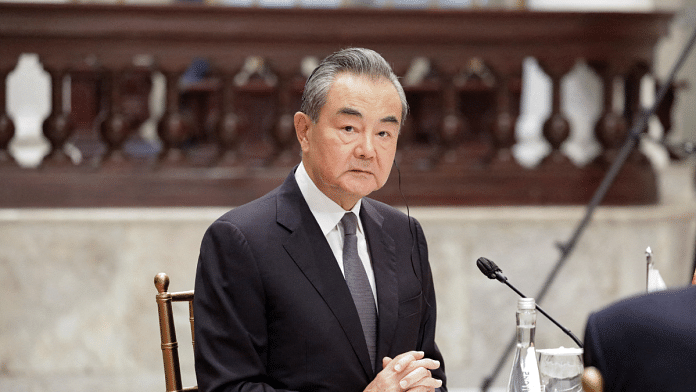A hallmark of great powers is their ability to mediate conflicts and wield influence over other countries. Yet, both the United States and China face challenges in this aspect. Despite China successfully brokering the Saudi Arabia-Iran deal in 2023, doubts persist about its efficacy in ongoing conflicts. The Israel-Hamas conflict has endured for over six months with no end in sight, drawing in additional stakeholders. On 13 April 2024, Iran’s retaliatory drone and missile strike on Israel heightened tensions and edged the region closer to a full-scale war.
In one of its initial responses, China urged all relevant parties to exercise restraint to prevent further escalation. During a phone conversation with his Iranian counterpart Hossein Amir-Abdollahian, Chinese foreign minister Wang Yi strongly condemned the attack on the Iranian consulate in Damascus on 1 April, denouncing it as “a clear violation of international law and utterly unacceptable”.
However, the absence of equally forceful language directed toward Israel in this exchange was notable. There was a robust declaration of understanding for Iran, framed as an act of self-defence against territory sovereignty violations. The Chinese side even drew parallels between the attack on Iran’s consulate in Damascus and NATO bombing of the Chinese embassy in Belgrade in 1999.
China appears to be retreating from active involvement, potentially constrained by its backing for a Gaza ceasefire, while Israel garners vigorous Western support. The adage “the enemy of my enemy is my friend” appears to apply solely to Iran in this context, as China struggles to exert influence over Israel.
Also read: All’s not well for China in Southeast Asia. Xi Jinping’s Vietnam visit just showed
China is struggling in the Middle East
China’s response to the Iran-Israel conflict starkly contrasts with the West’s stance, which is predominantly pro-Israel. This isn’t surprising, given the backdrop of the ongoing power rivalry between Washington and Beijing. China’s strategic alignment appears to prioritise relationships with countries overtly critical of the US, leading to a reluctance to criticise Iran. China has consistently supported and advocated for a two-state solution and frequently referenced the UN Security Council Resolution 2728, which calls for an immediate ceasefire in the Israel-Palestine conflict.
While China has actively positioned itself as a mediator for peace, particularly in the Middle East, where it seeks to diminish US influence, its ambitions face impediments, occasionally diverging from its stated goals. These obstacles stem from China’s own partnerships and interests. Notably, China has emerged as the top importer of Iranian oil, acquiring 90 per cent of the country’s oil exports in 2023. This trend is elucidated in an article by Atlantic Council, which argues: “China is more likely to continue to be the regional actor it has been over the past decade—one that comes to the Middle East to trade and build, not lead.”
Prioritising the preservation of existing peace deals emerges as a cautious approach compared to embarking on intricate negotiations within a region where China’s influence is limited among numerous stakeholders. On 15 April, the same day Wang and Abdollahian spoke, the Chinese foreign minister also contacted his Saudi counterpart, Faisal Bin Farhan Al Saud, emphasising “Iran’s non-targeted actions toward other regional states”. While focusing on the pre-existing deals, China wants to abstain from pursuits where its influence is limited and potential hurdles loom, thereby mitigating risks to its credibility.
Nonetheless, perceptions of China’s limited influence and its reluctance to intervene vary among Chinese social media users. One Weibo user (with over 2 million followers) highlighted the irony of US Secretary of State Antony Blinken urging China to leverage its influence on Iran for de-escalation while Washington concurrently stirs tensions between the Philippines and China.
Also read: Beijing is neutral on Israel-Palestine conflict. But Chinese people are saying something else
Why is China low-key?
Since the conclusion of the Iran-Saudi Arabia deal, China’s capacity to mediate conflicts has been constrained. It has taken somewhat clear stances in both the Russia-Ukraine and Israel-Palestine conflicts. While China is apprehensive about potential spillover effects, it currently appears disinclined to actively intervene. Beijing’s strategy involves delicately balancing its alignment with regional partners while sidestepping direct confrontation with Israel. The primary aim is to safeguard its interests and prevent any disruption to the Tehran-Riyadh deal, while also subtly bolstering ties with Iran.
Additionally, China grapples with numerous pressing issues, including economic challenges and the complexities surrounding the South China Sea and Taiwan. Given these circumstances, active involvement in the Middle East does not appear to be on the horizon. This stance underscores China’s cautious approach and prioritisation of its own interests, implying that assuming the role of a responsible power or even a mediator, particularly in the Middle East, is currently on the back burner.
Sana Hashmi, PhD, is a fellow at the Taiwan-Asia Exchange Foundation and George HW Bush Foundation for US-China Relations. She tweets @sanahashmi1. Views are personal.
(Edited by Humra Laeeq)



